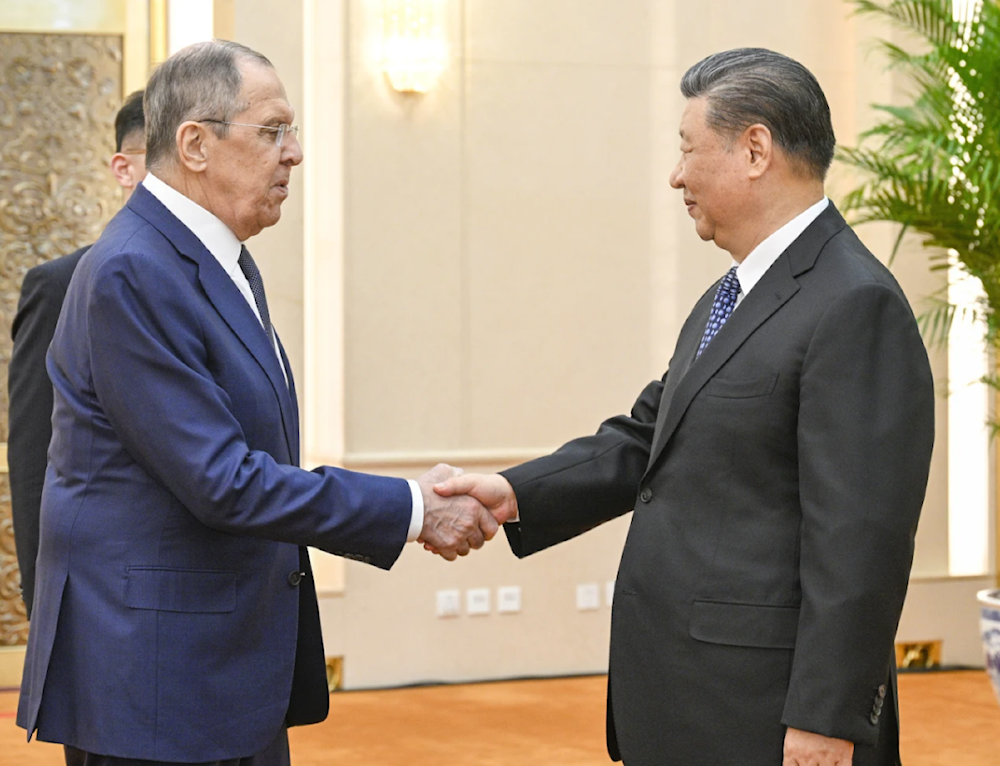Russia, China prove great powers can be good neighbors: Lavrov
The Russian and Chinese foreign ministers vow enhanced relations based on the spirit of good-neighborhood, friendship, and cooperation,
-

Russian Foreign Minister Sergey Lavrov and Chinese President Xi Jinping meet at the Great Hall of the People in Beijing on April 9, 2024. (AP)
Russian Foreign Minister Sergey Lavrov and his Chinese counterpart, Wang Yi, praised the two countries' strategic alliance in complimentary pieces released on Thursday.
Wednesday marked the 75th anniversary of established diplomatic ties between the two countries. The date was just two days after the People's Republic of China celebrated its 75th birthday. The Soviet Union was the first globally recognized country to establish official links with the new Chinese government, and it assisted in rebuilding after the horrific civil war in which communists triumphed over nationalists.
Lavrov and Wang observed that the two countries have surmounted what the Chinese minister referred to as "bumps" over the last three-quarters of a century. The USSR and PRC, once allies, had a severe falling out in the late 1950s and early 1960s. Territorial conflicts were finally addressed in 2005.
Commenting on the advancements, Lavrov remarked, "Working in the spirit of good-neighborhood, friendship, and cooperation, we have managed to build model relations for neighboring great powers."
He continued that cooperation is founded on the values of mutual respect, non-interference in internal matters, the lack of ideological characteristics, and mutual support in the global arena.
According to the senior leaders, strong contemporary connections provide significant economic benefits to both the Russian and Chinese communities.
Western financial pressure through trade restrictions has significantly impacted bilateral trade, with Russian energy and food products dominating the Chinese market, while mobile phones and vehicles flow in the opposite direction. Direct investment, cooperative technical initiatives, education, tourism, and other fields are all examples of increased cooperation.
Non-Western nations gain from Moscow and Beijing's joint efforts to promote a new multipolar world order, according to Lavrov and Wang. They are “opposing hegemony and power politics, illegal unilateral sanctions and ‘long-arm jurisdiction’, [and] interference in the internal affairs of sovereign states. The two parties actively seek opportunities and development for the countries of the ‘Global South’," the Chinese official wrote.
US wants greater EU support against Russia, China
Last month, Wang Yi reaffirmed China's commitment to deepening strategic cooperation with Russia during a meeting with Russian President Vladimir Putin, noting China's willingness to unite with like-minded nations and promote a multipolar world, challenging unilateral actions and bloc confrontations.
"China is willing to maintain strategic cooperation with Russia, unite more like-minded states, and promote the development of a multipolar world," Wang said, according to the Chinese Foreign Ministry.
In response, US Deputy Secretary of State Kurt Campbell said that the US is pressing for more European support as Russia establishes partnerships with nations such as China.
Campbell has previously stated that other nations backing Russia constitute a threat not only to Ukraine but also to long-term peace and stability in Europe.
He also divulged that the fundamental reason for spending substantial time in Europe was the steps taken against Chinese enterprises, such as sanctions and worries about funding arrangements between Chinese tech companies and their Russian counterparts.
Deputy Assistant Secretary of State for Western Hemisphere Affairs Eric Jacobstein also divulged that the cooperation between Nicaragua, China, and Russia has been deemed "extremely concerning" by the United States.
"This is extremely concerning, the collaboration between [Nicaragua] and Russia and PRC [People's Republic of China]," Jacobstein said on Thursday, adding that the trilateral relations remain a concern for Washington.

 4 Min Read
4 Min Read








